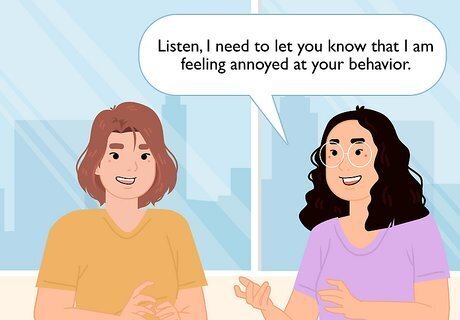
views
Maintaining Your Composure

Take a deep breath and stay calm. Though you may find it difficult to handle being around an annoying person, you should strive to maintain your composure and stay calm. Getting angry, upset, or frustrated may only ruin your day and have no real effect on how that person is behaving. Rather than let your emotions get the best of you, try to take deep breaths and remain calm. You may try doing deep breathing exercises, where you close your eyes and inhale deeply in your nose from your diaphragm, followed by a deep exhale out your nose. You may do deep breathing a few times to calm down and block out the annoying person.

Do not react to them. Though you may be tempted to yell or curse at the person who is annoying you, reacting to them will only upset you and give the person the attention they may be seeking. Instead you should focus on tuning out what they are saying and try not to react to them. Coping through non-reaction can be a good way to get used to the annoying person and not them get to you. You may try repeating a word in your mind to help you not react to the person. This word may be “compassion” or “acceptance”. Try saying the word in your mind over and over until it becomes a mantra for you to lean on.

Try to empathize with the person. To help maintain your composure, it may help to try to view a situation or issue from the person's point of view. Put yourself in their shoes for a second and consider why or how they may have become so annoying. Be empathetic toward the person and show them some compassion. Doing this may help you remain calm and composed around them. For example, perhaps the person who is always pointing out the negatives of every situation did not have a very happy childhood and tends to see only the worst possible outcomes. Or maybe the family member who is often too happy and excited about everything is in fact lonely and isolated in their social life, leading them to try to always project a sense of happiness.

Prepare some stock lines to say to the person. When you encounter this person, you may be so frustrated that you end up saying something that hurts his or her feelings. To prevent this from happening, try to develop a few stock lines that you can use to either engage with the person or end the conversation. ”Hmm, I'm glad you mentioned that because…” “That's interesting. I don't know the first thing about that!” “It was nice to see you, but I have to run!” “I'm sorry. I don't have time to talk right now. Maybe some other time.”

Take good care of yourself. If you are hungry, tired, or stressed, then you might find it harder to maintain your composure around someone who annoys you. Make sure that you are practicing good self-care to increase your chances of being able to maintain your composure. Some things you can do to ensure good self-care include: Getting enough sleep. Eating healthy foods. Exercising regularly. Making time to relax.
Avoiding Conflict

Set boundaries. If you find it difficult to be around the annoying person often, you may need to set boundaries so you do not end up getting too emotionally involved. Setting boundaries for yourself is an important coping mechanism and will ensure you are not put in situations where you might come into conflict with the person. You may try to limit the amount of time you spend with the person, such as only chatting to them briefly in the morning at work and leaving the office for lunch. Or you may only answer their calls or texts when you have free time rather than answering them right away. You may also try to remain calm and detached when they speak to in meetings or social situations where you cannot excuse yourself. Doing this can set up personal boundaries for you to help you cope with the person's irritating nature. For example, if the annoying person starts talking too loudly at a family dinner, you may try to stay detached and focus on something else in your mind. This will allow you to block out the person and stay calm.

Try to remain positive. You should also focus on the positive when you are around the person and try not to let their mood dampen yours. Being positive and proactive, rather than angry and reactive may discourage the person from trying to annoy you or bother you. One way you can appear positive is by maintaining open body language. This means maintaining eye contact with the person and nodding to show them you are not fazed by them. You should also keep your arms relaxed and by your sides. Avoid responding to the person with a passive aggressive comment or a snide remark. Instead, say something simple and polite like, “Thank you for sharing that with me” or “Sounds great.”

Stay away from the person. If you are unable to handle being around the annoying person, despite trying to remain positive, you may want to avoid being around the person. Keep your distance and look for ways to avoid spending time with the person. Sometimes the best way to cope is to separate yourself from the person and take some time away from them. You may try to keep your distance for a set period of time so that you have some space away from the person. Maybe you skip a family get together to take a small break from hanging out with the person. Or maybe you try to choose assignments at work that do not involve the person so you can have some space away from them.
Addressing the Issue

Identify what the issue is. You may end up having to confront the annoying person and try to work together on ways to address any issues you are having with them. Before you confront the person, you should sit down and try to identify what annoys you so much about the person. You may ask yourself, “What does the person do that annoys me so much?” or “What is it about this person that I find irritating?” You may then able to address the issue once you are aware of what it is. For example, you may be annoyed by the fact that your co-worker always comes into meetings late and appears disorganized in front of clients. You may then realize that you are annoyed by her behavior overall and how unprofessional she is acting. Another example might be that you are annoyed with how your family member always talks about themselves and ignores the problems of others. You may realize that you are annoyed by him because he is not considerate of others.

Discuss the issue with the person. If you would like to confront the person, you should do so one on one in a private, quiet area. You may ask the person if you can speak to them privately after work or call them and ask to talk to them in private. Try to speak to them in person, if possible. Always use “I” statements and avoid placing blame or accusing the person. For example, "I feel" or "I think." You may start the discussion by saying, “Listen, I need to let you know that I am feeling annoyed at your behavior.” You may then expand your thoughts and be honest about why you are annoyed by the person. You may say, “I feel as though your tardiness to meetings and your disorganization is reflecting badly on our team and the company as a whole. I am concerned that you are coming across as unprofessional to clients.” Or, you may say to your family member, "I feel as though you are not being considerate of others and are only focusing on your needs. I am concerned that you are not being as aware of others and their issues as you could be."

Come up with solutions together. You should try to work with the person to come up with possible solutions or adjustments they can make to their behavior. It may be difficult for the person to hear your feedback but they may end feeling bad about their behavior and be willing to try to adjust or change. You should ask them directly, “What can I do to support you better?” or “How can I help you improve?” Show them you want to collaborate and work together to address the issue.

Get support. It may be hard for the person to hear your feedback and they may end up getting upset or angry at you when you confront them. You should be prepared for the conversation to get a little heated. You may want to reach out to a superior at work, such as a Human Resources representative, a close friend or another family member, and ask them to support you if the conversation gets too intense. You should try to enlist support leading up to the conversation with the person who annoys you as well, as your co-workers or friends may be able to give you suggestions on how to address the issue. Make sure you do not gossip or trash talk to person with people in their workspace, their friend group or in your family, as this could just make the problem worse. Instead, try to talk about them respectfully with others and solicit advice on how to best handle the situation.



















Comments
0 comment